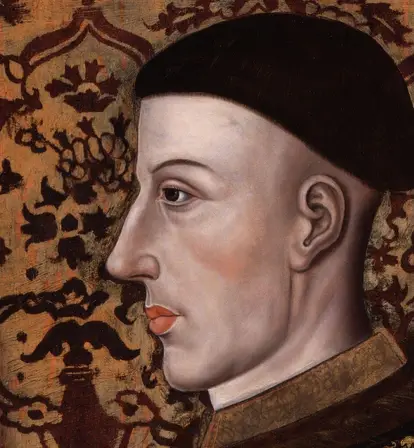Contrary to what Shakespeare and Netflix's The King would have you believe, King Henry V of England wasn't a wayward youth reluctant to lead, and he didn't go to war with France over a bunch of tennis balls.
Nearly two centuries after Henry V’s death, William Shakespeare launched the medieval king’s name into pop culture stardom with his historical fiction plays Henry IV: Part I, Henry IV: Part II and Henry V.
Since then, the warrior king that famously defeated the French at the Battle of Agincourt has been the stuff of legend. Netflix’s The King, starring Timothée Chalamet as the titular role, is only the latest in a long tradition of plays, novels, films, and TV dramas inspired by Shakespeare’s play.
But if we peel away the dramatic license of the Bard and Netflix, who was the real man behind all the myth?
Young Prince Hal, Son Of A Usurper
Despite his later fame, very little is known of Henry V’s early years. In fact, we do not even know for certain what year he was born. In either 1386 or 1387, Henry Bolingbroke, earl of Derby, and his wife Mary de Bohun, welcomed their first-born son Henry at their castle in present-day Monmouth, Wales.
Henry’s father, who would later be Henry IV, was a prominent nobleman and a cousin of the reigning king, Richard II. He was one of the leaders of a rebellion against Richard, and when he was banished in 1398, young Henry was taken as the king’s hostage.
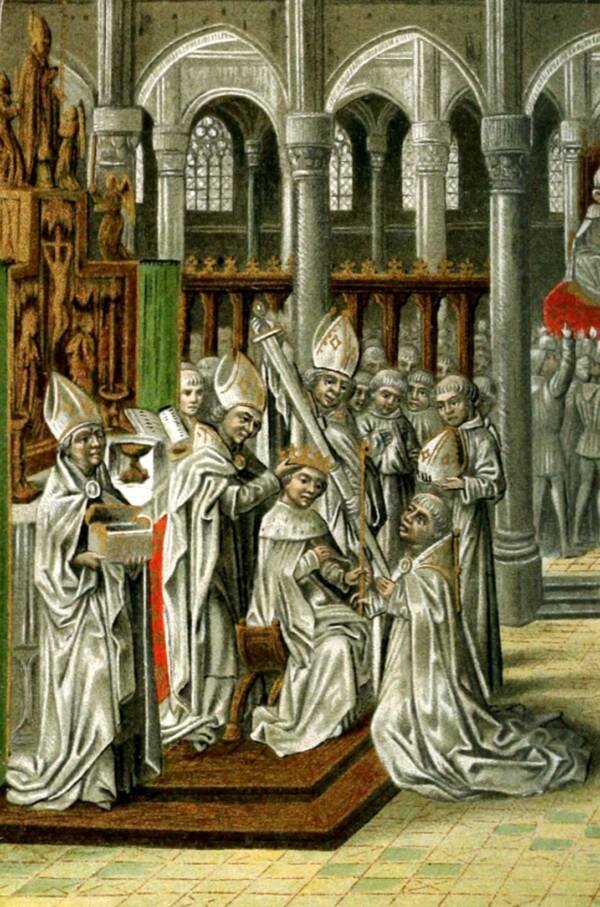
Wikimedia CommonsHenry V’s father, Henry IV, at his coronation.
Interestingly, Henry became close with his captor, who treated him surprisingly well given the circumstances. In fact, Richard gave the boy an annual allowance of £500, brought him along on his expedition to Ireland, and even knighted him.
In their absence, Henry’s father returned from exile and gained popular support in England. By 1399, Bolingbroke seized the throne, claiming a right to the crown through his descent from Henry III, and arranged for Richard II’s formal deposition in Parliament. He was crowned Henry IV, the first king from the Lancastrian branch of the House of Plantagenet.
This made young Henry the new Prince of Wales.
Henry studied at the Queen’s College at Oxford under the guardianship of his uncle, another Henry: Henry Beaufort, a Catholic bishop. He became fond of music and reading at an early age, learning to read and write in the vernacular tongue of English, which would prove important in later years.
Owing to Shakespeare’s liberal blending of fact with fiction in his historical dramas, Prince Henry — or “Prince Hal,” as the Bard famously nicknamed him — has gone down in history as a reckless young rogue.
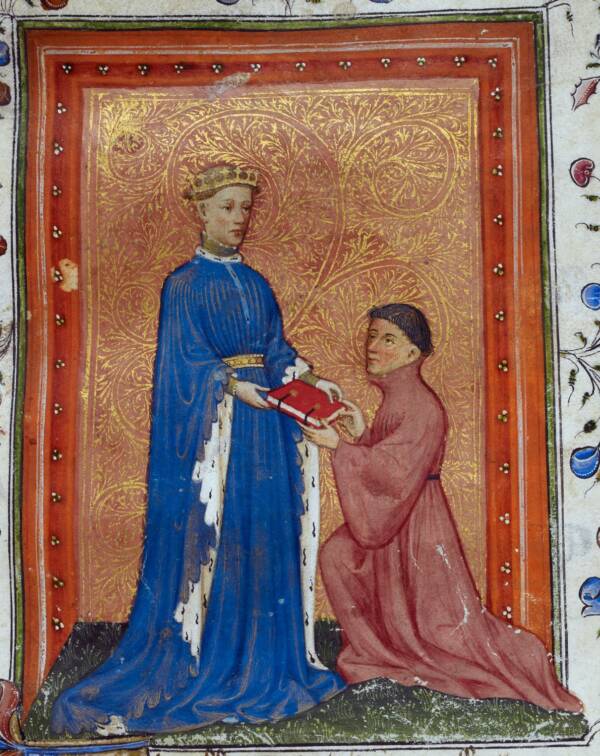
British Library/Wikimedia CommonsA miniature showing Henry as Prince of Wales, offering or receiving a book. The kneeling man is perhaps John Mowbray, 2nd Duke of Norfolk.
Henry IV: Part I and Henry IV: Part II focus on the early years of Prince Hal and his boisterous comrade Falstaff (a fictitious character invented by Shakespeare and played by Joel Edgerton in The King that was loosely based on a real man named John Oldcastle, a former friend of Henry’s that he later executed for heresy and rebellion).
Together, they supposedly spend their time playing pranks, consorting with thieves and drunks, and passing out after long nights at the tavern. When The King opens, Prince Hal is estranged from his father, cut off from the line of succession in favor of his younger brother, completely uninterested in politics and knee-deep in teenage debauchery.
According to Shakespeare’s play, it is only after Henry’s father died that he suddenly transformed and matured; or, as his character famously declares, he was like a brilliant sun (a play on son, or heir) waiting to come out from behind the clouds.
Historians have since debated the historicity of this “prince-gone-wild” prodigal son persona. In reality, Prince Henry played an important role in his father’s regime, and it was his political involvement — not his supposed political indifference — that often led to disagreements between father and son.
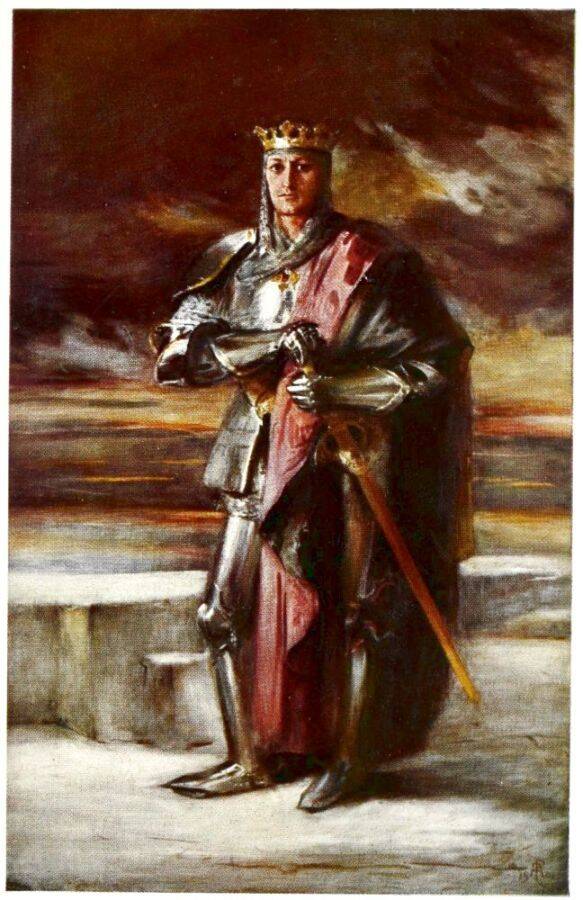
Wikimedia CommonsActor Lewis Waller playing Henry V in Shakespeare’s 1599 play.
But the friction that may have existed between them was nothing like what Shakespeare and now Netflix made it out to be — nor was there any debate that he was his father’s heir.
And nor was Prince Hal the angsty teenage pacifist that The King romantically paints him as, rendering him more palatable to our 21st-century sensibilities. The historical Prince Hal spent 10 years of his youth on the battlefield, fighting for his father, helping him ward off rebellious lords that saw him as a usurper.
In 1403, the 16-year-old prince fought his first battle against yet another Henry: the rebellious nobleman Henry “Hotspur” Percy. The young prince demonstrated strong military potential and led his father’s forces to victory (unlike in The King, when Prince Hal declares that “if it were up to me, there will be no battle,” choosing to fight Hotspur in a one-on-one duel to avoid unnecessary loss of men).
However, the battle did happen, and he nearly perished after an arrow lodged six inches into his skull, directly beneath his eye and narrowly missing his brain and spinal cord. At this point, he became something of a national hero; one historian called Henry’s injury the “marke of his manhood.”
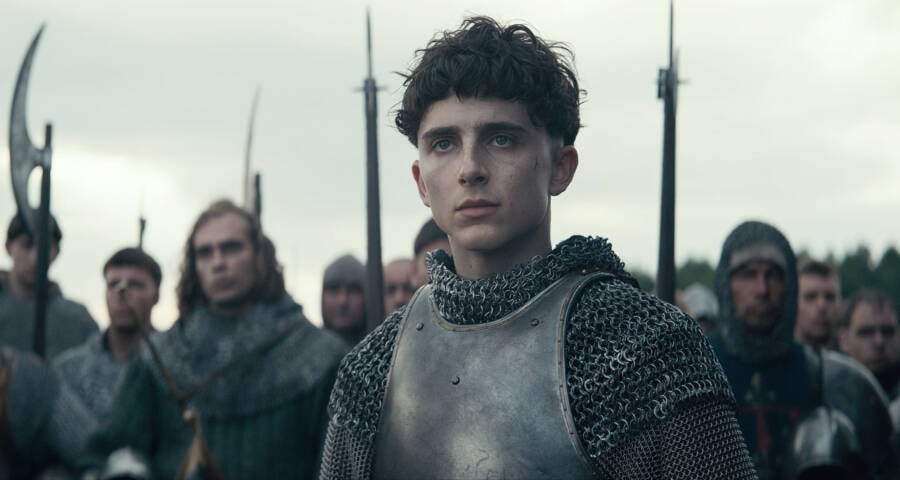
Netflix Timothée Chalamet plays King Henry V of England in The King.
After the Battle of Shrewsbury, Prince Henry spent the next five years protecting his father’s crown against another rebellion, this time led by Owain Glyndŵr in Wales.
King Henry V Of England
After Henry’s father died of an illness in 1413, the 26-year-old prince was crowned King Henry V of England. His coronation ceremony took place in Westminster Abbey on April 9, 1413, and the snow that fell that day was interpreted as a sign that difficult times would come.
On the domestic front, like his father, Henry V faced criticism and conspiracies from both former friends and longtime enemies who rejected his legitimacy and wanted to place Richard II’s heir, Edmund Mortimer, on the throne instead.
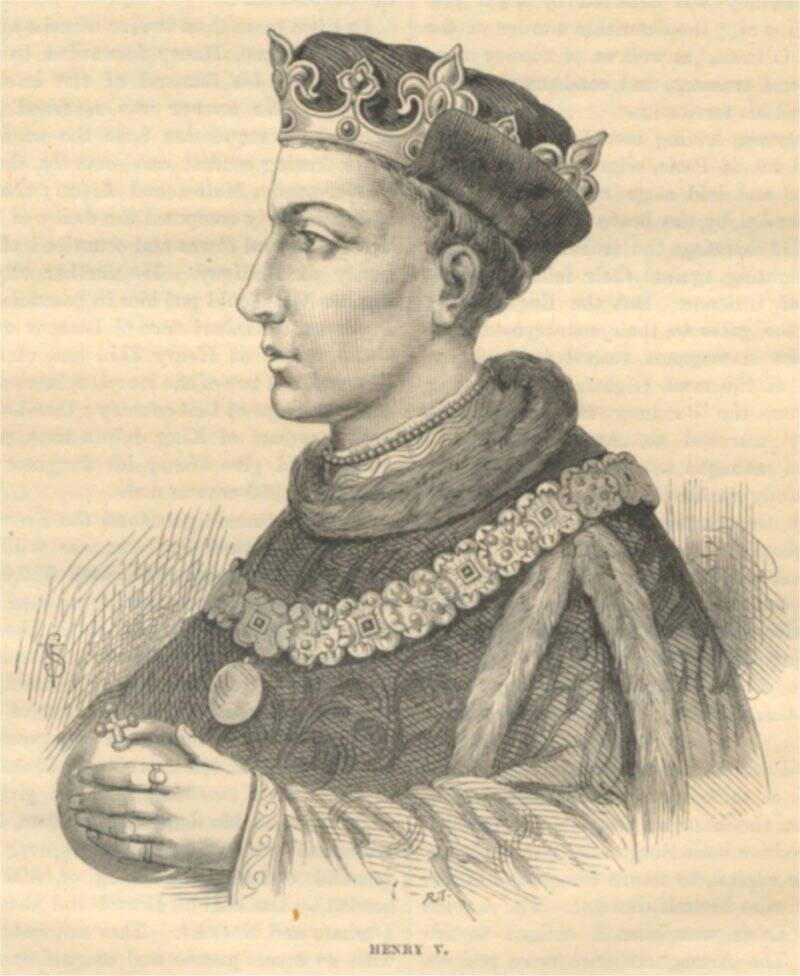
Wikimedia CommonsAn illustration from Cassell’s History of England, circa 1902.
In The King, the reluctant new ruler insists “I am not my father,” pushing off his advisors, who keep nagging him to go to war. He also declares that the men who were his father’s enemies, the rebellious lords, will be pardoned and forgiven, and that a new peace will be brought about in England.
In reality, it was Henry’s father that had wanted peace. The new Henry V wanted war.
He protected his crown and crushed these rebellions, often showing a brutal side by refusing to show mercy to his defeated opponents.
Interestingly, one of his first moves as king of a united England was to introduce the formal use of English in all government proceedings, making him the first ruler to use the vernacular rather than French or Latin, as had been customary since the Norman Conquest of England in 1066.
Next, Henry V turned his eyes toward France.
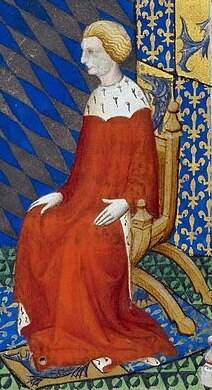
British Library/Wikimedia CommonsThe dauphin Louis of France, son of King Charles VI.
According to Shakespeare, the new English king was convinced by two bishops that he was the rightful king of France due to his ancestry. In response to his claim, the French Dauphin supposedly sent a barrel of tennis balls across the Channel as an insult to his maturity, and Henry set sail immediately to avenge the insulting jest.
In The King, a rickety old archbishop starts droning on with a lisp about an ancient law that was used to prevent Henry’s ancestors from inheriting the French throne that should be contested (this was the Salic Law). Henry responds with confusion, wondering what he is talking about and brushing off the archbishop’s endless “bleating.”
It seems that Chalamet’s Henry is completely unaware of the generations-long fight between his country and France, which was still technically taking place, and demonstrates no interest in French conquest. He resists provocation from the Dauphin — eccentrically played by a thickly French-accented Robert Pattinson — and ignores a supposedly French-sponsored assassination attempt. He wants to create a “peaceful air” for his people to breathe and refuses to go to war, despite the building pressure from his advisors.
In reality, the English house of Plantagenet and the French house of Valois had been engaged in a complex conflict for generations at this point, known now as the Hundred Years’ War.
Soon after he was crowned, Henry V decided to renew England’s military campaigns in France and developed an ambitious list of demands.
Not only did he want the French to return land that was lost to his ancestors, including Aquitaine, Normandy, Touraine, and Maine, but he also wanted the French to pay a staggering amount of 2 million crowns, and he wanted Catherine of Valois, the daughter of Charles VI, King of France, as his bride.
Henry’s renewal of the Anglo-French war was therefore not a personal quarrel between two young rivals, and the tennis ball scene has been discredited as a complete fabrication that served as comic relief in Shakespeare’s dramatization.
The French Wars And The Battle Of Agincourt
Henry V set sail to France in 1415, just two years after his coronation. His early battlefield experience prepared him well: He quickly began collecting victories.
The Royal Family’s official website calls him a “brilliant general” — in stark contrast to the haphazard and spasmodic operations the English planned in the previous century.
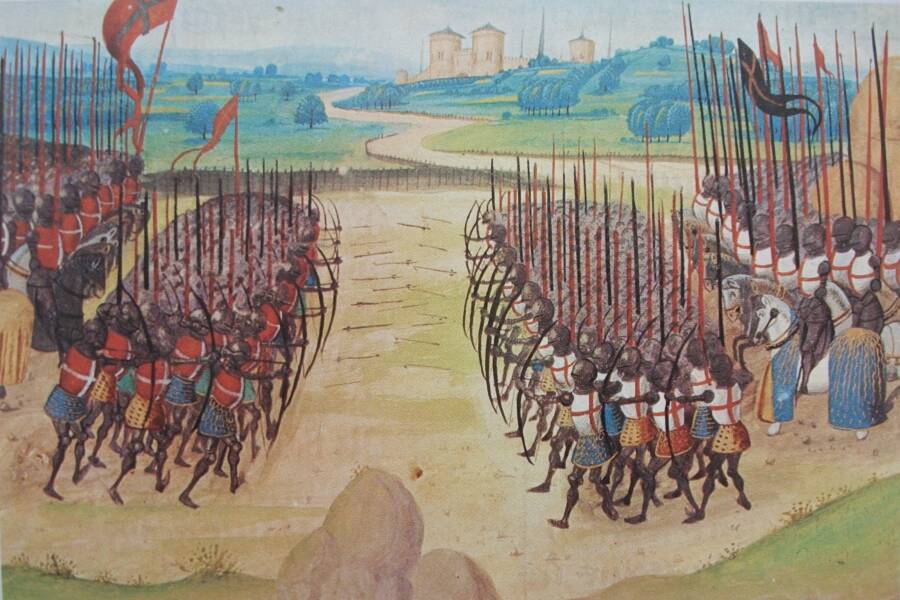
Antoine Leduc, Sylvie Leluc et Olivier Renaudeau (dir.), D’Azincourt à Marignan. Chevaliers et bombardes, 1515-1515, Paris, Gallimard / Musée de l’armée, 2015, p. 18-19 | Wikimedia Commons An early 15th-century miniature of the Battle of Agincourt (1415).
First, in August 1415, he laid siege to the port town of Harfleur and captured it after attacking the city with his large fleet. In Shakespeare’s rendition, Henry V rallies his troops before the siege by beckoning them to join him “once more upon the breach, dear friends, once more.”
When French defenses prevented him from crossing the Somme River with his 6,000-strong army, the French intercepted him at the city of Agincourt. On October 25, 1415 — St. Crispin’s Day — Henry once again rallied his troops with a powerful speech — at least according to Shakespeare. In the play, his character urges his “band of brothers” to have courage.
This dramatized speech, one of the most famous speeches in history, was further immortalized when Laurence Olivier used it to raise British morale during World War II and when Kenneth Branagh recited it in his 1989 film rendition of Henry V; now, the term “band of brothers” is a slogan for the romantic notion of unity and comradery in combat.
Alas, according to medieval popular historian Dan Jones, the speech was “entirely invented.”
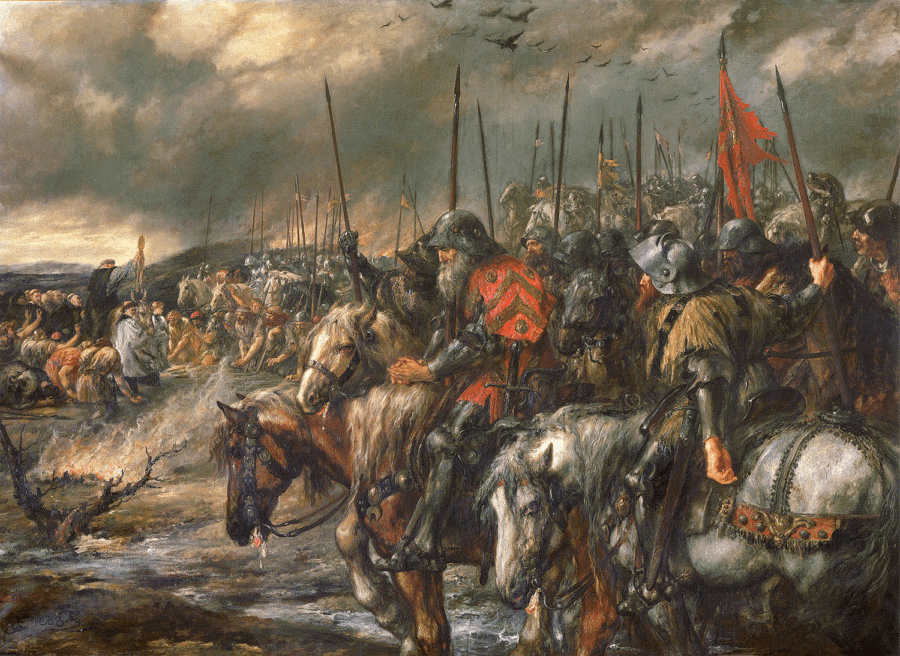
Wikimedia CommonsA 19th-century painting by Sir John Gilbert showing the muddy fields at the Battle of Agincourt.
However, he says that the tone that the Shakespearean Henry V uses in the play matches the grandeur of the tone that the real Henry used in the letters he dictated from the frontlines. The speeches’ words may not have been based in historical fact, but the spirit of them was.
At the Battle of Agincourt, now one of the most legendary battles in English history, the massively outnumbered English force (even conservative estimates say the French outnumbered them 2 to 1) defeated the French due to the expertise of their longbow arches and the luck of the weather, the incessant rain turning the battlefield into a sea of mud that the French soldiers drowned in, weighed down by heavy armor.
Henry V And Catherine Of Valois
Henry V returned home victorious, his performance at Agincourt solidifying his powerful position on the European political stage. The Holy Roman Emperor honored him with a visit in 1416, and together they managed to end the papal schism when Martin V became the new pope in 1417.
But contrary to what we would think after watching Agincourt as the dramatic climax to Henry V’s life in Shakespeare’s play and The King, this was not the end in reality.
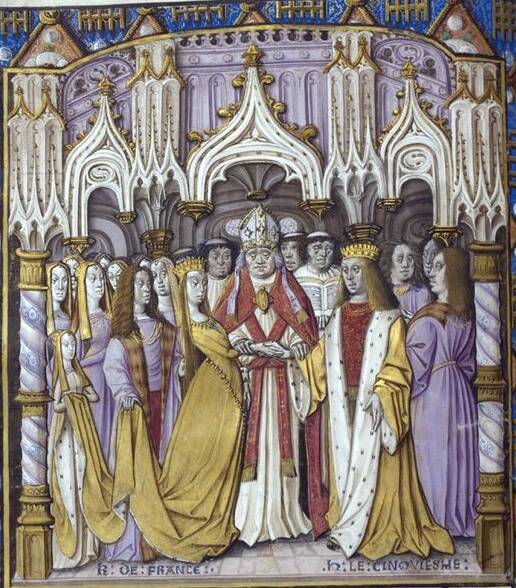
Wikimedia CommonsA painting dated before 1494 depicting the marriage ceremony of Henry V of England and Catherine of Valois.
Henry sailed back to France in 1417 and launched a new campaign of sieges, continuing his work on the battlefield. By 1419, he conquered Rouen, the capital of Normandy, bringing the duchy into English control.
These victories forced France to its knees and King Charles VI agreed to the terms of the Treaty of Troyes on May 21, 1420, which named Henry V as the rightful heir to the French crown, disinheriting the Dauphin. The treaty also betrothed him to the French Princess Catherine of Valois (played by Lily-Rose Depp in The King), the youngest daughter of the French king.
On June 2, 1420, Henry and Catherine were married at Troyes Cathedral. Their union was not the love match that plays, films, and novels have idyllically suggested; nor did they marry immediately after the French defeat at Agincourt.
The Final Years
Henry V and Catherine of Valois arrived in England in 1421 and she gave birth to their only son who — you guessed it — they named Henry.
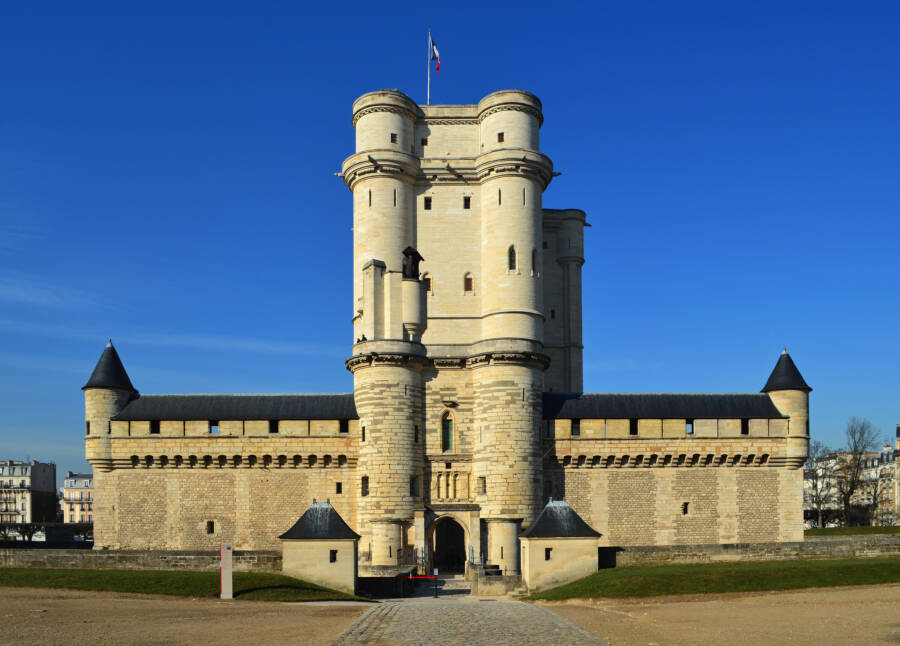
Wikimedia CommonsKing Henry V of England died at the Château de Vincennes in Paris, mere weeks before he would have taken over the French throne.
In the meantime, Henry V had already returned to France yet again after the death of his younger brother, who was still fighting on French soil. He continued to fight for French territory and engage in the complicated politics of the nation which he was supposed to inherit.
In October 1421, he led a siege on the French city of Meaux. The battle was difficult and long — it stretched on for seven months — and during the bitter winter Henry V fell ill. He suffered from battlefield dysentery and died on Aug. 31, 1422, just shy of his 36th birthday.
The son he left behind, though less than nine months old, was quickly proclaimed King Henry VI. The difficult times that Henry V’s coronation snowfall foretold came to be with his son, whose tragic reign was riddled with bouts of mental health struggles and the loss of most of the French territories that his father had fought so hard to conquer.
After learning about the life of King Henry V of England, take a look at the complicated lineage of the British Royal Family. Then, check out Charles II, the inbred Spanish king who was so ugly he scared his own wife.
